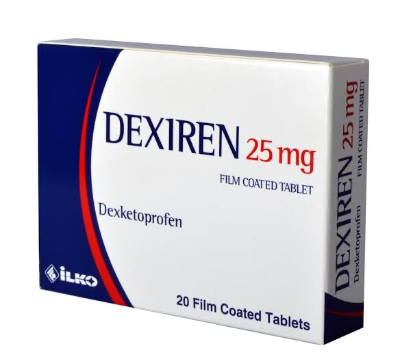


Pain - mild to moderate
Adult
Recommended dosage is 12.5 mg every 4 to 6 hours or 25 mg every 8 hours. Total daily dose should not exceed 75 mg.
It is recommended to start the therapy at the lower end of the dosage range (50 mg total daily dose). The dose may then be increased to normal adult dosage once a good tolerance for the drug has been established.
Children under 18 years
Haemorrhagic diathesis
Photoallergic or phototoxic reactions to fibrates
Varicella
Breastfeeding
Chronic dyspepsia
Coagulopathy
Crohn's disease
Gastrointestinal haemorrhage
Gastrointestinal ulcer
History of asthma
History of coagulopathy
History of gastrointestinal ulceration
Nasal polyps, angioedema, and bronchospastic reactivity to NSAIDs
Renal impairment - creatinine clearance below 60ml/minute
Severe cardiac failure
Severe dehydration
Severe hepatic impairment - Child-Pugh score greater than or equal to 10
Third trimester of pregnancy
Ulcerative colitis
Allergic disposition
Disorders aggravated by fluid retention
Elderly
Females attempting to conceive
Recent major surgery
Acute porphyria
Cardiac impairment
Cerebrovascular disorder
Congestive cardiac failure
Connective tissue disorder
Dehydration
First trimester of pregnancy
Haematopoietic disorders
Hepatic impairment
Hypovolaemia
Ischaemic heart disease
Renal impairment - creatinine clearance 60-89ml/minute
Second trimester of pregnancy
Systemic lupus erythematosus
Uncontrolled hypertension
Dexketoprofen is contraindicated during the third trimester of pregnancy but may be used with caution during the first and second trimester.
Use of dexketoprofen during the third trimester of pregnancy is contraindicated by the manufacturer.
Dexketoprofen is contraindicated during breastfeeding.
Abdominal pain
Abnormal liver function tests
Acne
Agranulocytosis
Anaphylactic reaction
Anaphylactic shock
Angioedema
Anorexia
Anxiety
Aplastic anaemia
Arterial thrombosis
Aseptic meningitis
Asthenia
Back pain
Blurred vision
Bone marrow hypoplasia
Bradypnoea
Bronchospasm
Colitis
Congestive cardiac failure
Constipation
Diarrhoea
Dizziness
Drowsiness
Dry mouth
Dyspepsia
Dyspnoea
Epidermal necrolysis
Exacerbation of Crohn's disease
Exfoliative dermatitis
Facial oedema
Fatigue
Flatulence
Fluid retention
Flushing
Gastritis
Haematemesis
Haematological reactions
Haemolytic anaemia
Headache
Hepatic damage
Hepatitis
Hepatocellular damage
Hypertension
Hypotension
Increases in hepatic enzymes
Insomnia
Interstitial fibrosis
Laryngeal oedema
Lyell's syndrome
Malaise